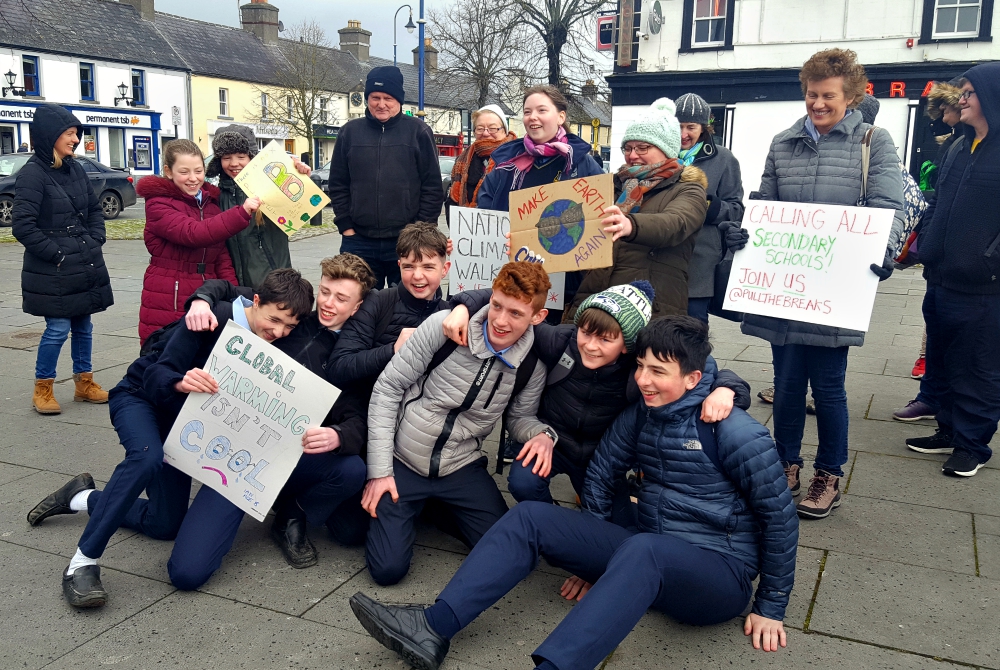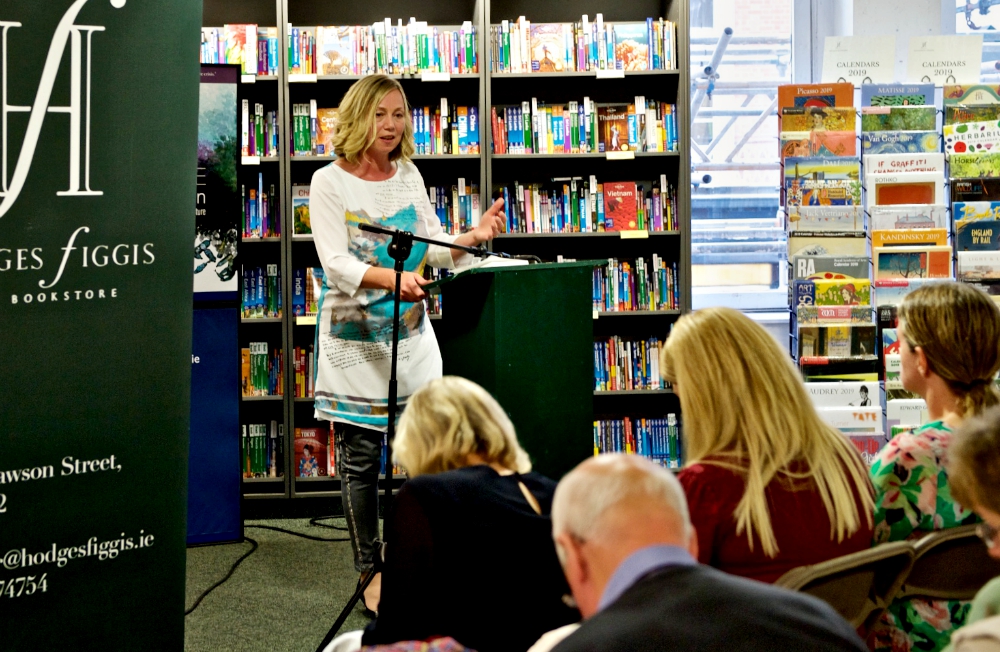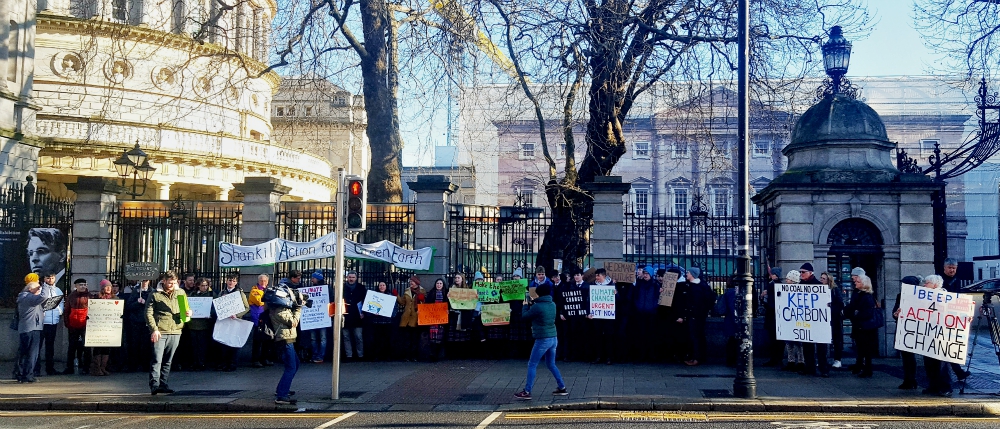
Some of the students who joined a climate action Feb. 8 in Maynooth, Ireland, pose for a photo. (Courtesy of Lorna Gold)
Weekly strikes by schoolchildren protesting over the threat posed by climate change are set to escalate March 15 in Ireland. Thousands of students are expected to assemble outside the Dáil Éireann, the Irish house of parliament, as part of a global day of action aimed at pressuring governments to act to save the planet before it is too late.
Since last December, a steady flow of students, as well as some teachers, parents and grandparents, have kept a weekly vigil in the center of Dublin as part of Swedish student Greta Thunberg's #FridaysForFuture movement. The 16-year-old staged the very first strike in August 2018 outside the Parliament House in Stockholm. The last week of February, a group of more than 200 students showed up in Dublin chanting, "We are unstoppable — another world is possible."
The protests have been good-natured and exuberant, but the message is deadly serious: If we fail to change, the world's climate will be altered with catastrophic consequences for the planet and all of its life. The youthful protesters in Ireland — and the 54 other countries where climate strikes are taking place — want governments to take action in line with the Paris Agreement. The students warn, "It's now or never," and appeal to politicians to "make Earth great again."
Lorna Gold, who works for Trócaire, the Irish Catholic Bishops' Conference development agency, and is on the board of the Global Catholic Climate Movement, believes the climate strikes are "an opportunity for children and young people who don't have a vote yet to show active citizenship. There is a real opportunity for them to speak out and demonstrate in their own way on an issue that they care passionately about."
When NCR interviewed Gold, she had just learned that the Teachers Union of Ireland had passed a motion in support of teachers who want to facilitate the participation of their students in the March 15 protest. The movement is gaining momentum.
"This has been very much a school-supported initiative in Ireland," Gold said. The protests outside the Dáil "have been very much a partnership between the teachers and parents facilitating students who want their voices to be heard and to be part of the global action."
Gold was actually the very first person to turn up for a climate protest outside the Irish parliament in December 2018. That day, she was joined by three others, including Jim Scheer of the Sustainable Energy Authority of Ireland.
"The two of us started it on the same day," Gold said. "Jim had become much more passionate about taking action and protesting."
Gold had taken that Friday off work to do some Christmas shopping when she received a text from Scheer. He sent a link of Thunberg's December speech at the United Nations' COP24 climate change meeting with a message: "I think we need to join in solidarity with Greta."
Advertisement
"That one-minute speech sums up where the world is at and where we need to be going," Gold said. "So that's how we started."
The following week, the numbers of protesters had doubled to eight and now every week hundreds of students from different schools show up.
One original protester is Michael Grehan, a science teacher at a Catholic school in north Dublin. Each week, a different group of students accompany Grehan outside the Irish parliament. On some occasions, the students, who are aged 16 to 18, have taken part in the actions during their own free time.
"It doesn't surprise me that this action has captured the imagination of students, because the imagination of students is very powerful," Grehan told NCR, explaining that the school principal and vice principal are supportive of the students' involvement. "But I also think it is important that the students are aware that the source of our concern about human-induced climate change is solid science."
He believes students are better informed now about the science around climate change than even a decade ago. A number of students have told Grehan that they are taking part because of Ireland's poor response to addressing climate change.
"They think it is disgraceful and they want to protest against that," Grehan said.
In Gold's opinion, the movement, for now, is about conscientizing people and building a groundswell of understanding and awareness around the urgency of climate change and the fact that Ireland is not stepping up to its climate commitments. The main impact of the protest thus far has been via social media, where videos of the Dáil protests have reached 25,000 views, Gold said.
However, new hubs of protests have begun in other cities in Ireland, such as Cork, Kilkenny, Limerick and Maynooth, suggesting that the level of interest and commitment is increasing, not waning.
"There is a huge energy behind this — it really has stopped people in their tracks," Gold said. "You can get a sense that these young people are taking this into their own hands and they have an energy and a sense of wanting to change things. It is a level of energy I haven't seen in the nearly 20 years that I have been working on climate justice issues."
This loosely connected movement didn't have a set of demands for the Irish government, but on March 6, Ash Wednesday, a group of students presented politicians with a list. The demands echoed the 13 recommendations made by the Citizens' Assembly on climate change that met in April 2018. Delegates at the Citizens' Assembly focused on the science of climate change, agriculture and transport policy, and heard contributions from the climate change advisory council.
The assembly's recommendations included:
- An increase in the carbon tax;
- Increased funding for infrastructure for public transport and cycling, as well as for the retrofitting of public buildings;
- Support for the agriculture sector to transition to production processes that emit lower levels of greenhouse gases;
- A directive that all new buildings should have a zero or low carbon footprint as part of their planning permission.
Ironically, Gold, the very first protester to turn up for a climate strike outside the Irish parliament, and the inspiration for many students, parents and teachers who have participated in the protests, won't be in the country for the major gathering March 15. She will be speaking at a divestment conference for faith-based actors in Washington, D.C.
The conference will also include a soft launch of the U.S. edition of her book, Climate Generation: Awakening to Our Children's Future, published recently by New City Press. The book will be officially launched on June 6 in Boston by renowned U.S. environmentalist and activist Bill McKibben.

Lorna Gold launches her book at a bookstore in Dublin in September 2018. (Courtesy of Lorna Gold)
Gold, 46, and the mother of two boys, said that her book was written with concerned parents who care about their children's future and the world being a safe place for them in mind.
"Climate change is one of those issues that is really staring us in the face now and as parents we have a real responsibility to at least understand the issue in terms of what it means for our children's future," she said. "Once we understand it, we need to identify the measures we can take to try and mitigate or alleviate what is going to happen if we don't change our ways.
"I don't see it as a book about climate change; I see it as a book about how we safeguard the world for our children's future. Climate change has gone from being one of those big issues out there to being something really personal to me — it affects me, my family, my children; it affects all those people that I know through my work in Trócaire who are directly affected by it in developing countries."
Mary Robinson, former president of Ireland, recognizes this need to connect the climate issue with personal stakes. She is founder of the Mary Robinson Foundation — Climate Justice.
"We need more narratives on climate change so that people are encouraged to make it a personal issue in their lives," Robinson said of Gold's book. "This compelling personal story of a mother and activist makes that emotional connection very well, as she wakes up to the danger her children are in and connects the dots on how to safeguard their future."
Gold acknowledges that many feel powerless in the face of such a huge challenge.

A climate action is held Feb. 1 outside the Dáil Éireann, the Irish house of parliament, in Dublin. (Courtesy of Lorna Gold)
"There is a sense of powerlessness — this is so huge, it involves everyone changing everything, all at the same time. If you stay in this place of powerlessness and think, 'I can't do anything, I'm too busy,' it can be quite soul-destroying and despairing," she said. "But what I have discovered is if you move out of that powerlessness and start to take an action, as soon as you step forward, hope starts to grow."
That was Thunberg's message to the United Nations, Gold said.
"The actual action of raising your voice with other people allows you to make connections with other people and then you start to see that you are not alone; you are not the only one who wants things to change, that there are many other people who want things to change," she added.
Tackling climate change and tackling ecological destruction is, she says, "the most natural part of my Catholic faith."
"It is about fighting for life," Gold said. "Sometimes in Catholicism, we see life issues as only human life issues and then there is the rest of life on this planet. But to me, you cannot separate those issues, they are one and the same. We all need to fight for life on this planet.
"Human life, of course, has a special place in this planet as the image of God, but the image of God is reflected in the whole of the creation, the whole of the Earth — this beautiful home we live on. And there is no home for humans if we destroy creation. It is really about what Pope Francis calls an integral ecology."
[Sarah Mac Donald is a freelance journalist based in Dublin.]








